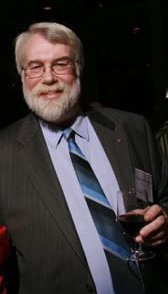

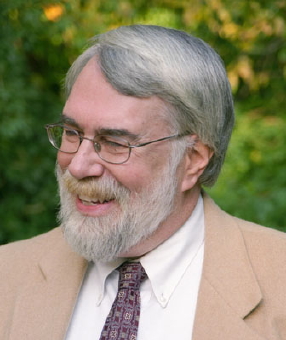 CR: It’s funny, I am rather stingy with markings
for some reason. I don’t know if it’s just inherent laziness or whether
it’s something else, but I am not someone who throws all sorts of instructions
into the score. I usually give a tempo marking — some
kind of general indication such as adagio
or allegro, and perhaps
an occasional expressive adjective to define a very general sense of the
mood. But other than that I tend not to get too crazed with instructions
on the page.
CR: It’s funny, I am rather stingy with markings
for some reason. I don’t know if it’s just inherent laziness or whether
it’s something else, but I am not someone who throws all sorts of instructions
into the score. I usually give a tempo marking — some
kind of general indication such as adagio
or allegro, and perhaps
an occasional expressive adjective to define a very general sense of the
mood. But other than that I tend not to get too crazed with instructions
on the page.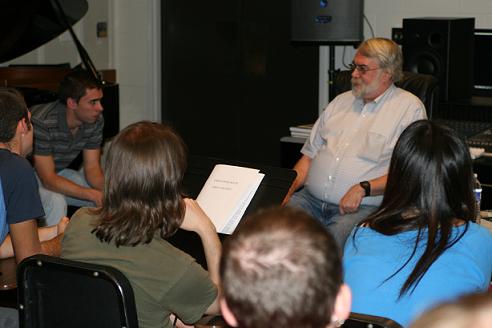 CR: I compose when I’m not teaching, essentially.
I’m a summer composer. I find it mentally very draining to teach, so
when classes are in session, I don’t actually compose — at
least physically. When I have free time I might do a lot of the mental
work, the preparation work, but not the process of actually writing out the
score, at which juncture there are still many, many decisions that need to
be made on an ad hoc basis. That’s something I really pretty much reserve
for summers. So it’s always a race from the minute the last class has
ridden off into the sunset until Labor Day when school starts up again; I’m
kind of racing the clock to try and get whatever the project at hand is finished
in time.
CR: I compose when I’m not teaching, essentially.
I’m a summer composer. I find it mentally very draining to teach, so
when classes are in session, I don’t actually compose — at
least physically. When I have free time I might do a lot of the mental
work, the preparation work, but not the process of actually writing out the
score, at which juncture there are still many, many decisions that need to
be made on an ad hoc basis. That’s something I really pretty much reserve
for summers. So it’s always a race from the minute the last class has
ridden off into the sunset until Labor Day when school starts up again; I’m
kind of racing the clock to try and get whatever the project at hand is finished
in time. 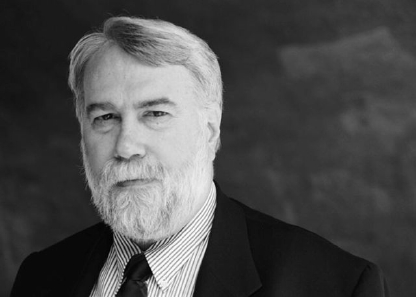 CR: That would be nice; we have really for some
time. Since the time of Beethoven there have been several different
approaches going. Everything seems to be kind of coalesced into Beethoven.
Although even there, there are composers of Beethoven’s time who really did
an end run around Beethoven. I would say Rossini might fit that description,
but for the most part everything kind of feeds into Beethoven. But
out of Beethoven comes one line, the more classically oriented 19th century
branch of Schubert or Mendelssohn and Brahms. Then on the other hand
you have the line of Weber, Berlioz, Wagner and so forth.
CR: That would be nice; we have really for some
time. Since the time of Beethoven there have been several different
approaches going. Everything seems to be kind of coalesced into Beethoven.
Although even there, there are composers of Beethoven’s time who really did
an end run around Beethoven. I would say Rossini might fit that description,
but for the most part everything kind of feeds into Beethoven. But
out of Beethoven comes one line, the more classically oriented 19th century
branch of Schubert or Mendelssohn and Brahms. Then on the other hand
you have the line of Weber, Berlioz, Wagner and so forth.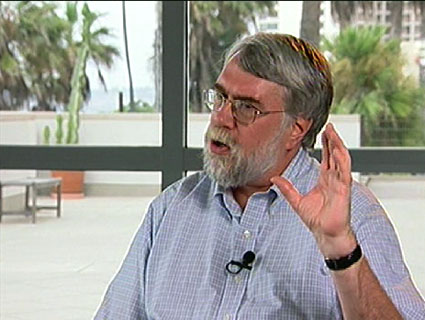 CR: I don’t know. I honestly don’t know.
The idea of “entertainment” is
a loaded one and a very complex issue. Is one entertained by the Mahler
Sixth Symphony? Is it an entertaining
work? I would say my definition of entertainment does not suffice to
describe what my reaction is to the Mahler Sixth, which is a meat grinder of a work.
One feels like one has really been put through the wringer at the end of that.
If by “entertain” we simply mean
that the listener’s attention is held, that they are somehow wrapped up in
the experience of hearing this music, then I would hope that all good music
is entertaining and all performances are good enough to get that aspect across.
I was in Cincinnati with the orchestra there some years ago and during a
pre-concert thing a lady said, “Well, if it’s not pleasant, it’s not music.”
Then another one said, “I love after a hard day’s work to get into the bubble
bath and relax to the Beethoven Ninth Symphony.”
I tried respectfully to propose that the Beethoven Ninth really isn’t bubble bath music.
If that’s what we mean by entertainment, then I think we’re in a somewhat
murky area. We should not have to do all sorts of zippy things to sell
the Beethoven Ninth. It should
sell itself rather than having all sorts of other things involved.
If you want to have a light show, do the Scriabin Prometheus.
CR: I don’t know. I honestly don’t know.
The idea of “entertainment” is
a loaded one and a very complex issue. Is one entertained by the Mahler
Sixth Symphony? Is it an entertaining
work? I would say my definition of entertainment does not suffice to
describe what my reaction is to the Mahler Sixth, which is a meat grinder of a work.
One feels like one has really been put through the wringer at the end of that.
If by “entertain” we simply mean
that the listener’s attention is held, that they are somehow wrapped up in
the experience of hearing this music, then I would hope that all good music
is entertaining and all performances are good enough to get that aspect across.
I was in Cincinnati with the orchestra there some years ago and during a
pre-concert thing a lady said, “Well, if it’s not pleasant, it’s not music.”
Then another one said, “I love after a hard day’s work to get into the bubble
bath and relax to the Beethoven Ninth Symphony.”
I tried respectfully to propose that the Beethoven Ninth really isn’t bubble bath music.
If that’s what we mean by entertainment, then I think we’re in a somewhat
murky area. We should not have to do all sorts of zippy things to sell
the Beethoven Ninth. It should
sell itself rather than having all sorts of other things involved.
If you want to have a light show, do the Scriabin Prometheus. 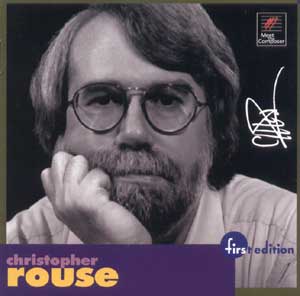 BD: A lot of composers find that it’s fairly easy
to get first performance but not so easy to get a second performance.
Do you find that also?
BD: A lot of composers find that it’s fairly easy
to get first performance but not so easy to get a second performance.
Do you find that also?|
Christopher Rouse is one of America's most prominent composers of orchestral music. His works have won a Pulitzer Prize (for his Trombone Concerto) and a Grammy Award (for Concert de Gaudí), as well as election to the prestigious American Academy of Arts and Letters. Rouse has created a body of work perhaps unequalled in its emotional intensity. The New York Times has called it "some of the most anguished, most memorable music around." The Baltimore Sun has written: "When the music history of the late 20th century is written, I suspect the explosive and passionate music of Rouse will loom large." Born in Baltimore in 1949, Rouse developed an early interest in both classical and popular music. He graduated from Oberlin Conservatory and Cornell University, numbering among his principal teachers George Crumb and Karel Husa. Rouse maintained a steady interest in popular music: at the Eastman School of Music, where he was Professor of Composition until 2002, he taught a course in the history of rock for many years. Rouse is currently a member of the composition faculty at The Juilliard School. While the Rouse catalog includes a number of acclaimed chamber and ensemble works, he is best known for his mastery of orchestral writing. His music has been played by every major orchestra in the U.S., and numerous ensembles overseas including the Berlin Philharmonic, the City of Birmingham Symphony Orchestra, the Sydney and Melbourne Symphonies, the London Symphony, the Philharmonia Orchestra, the Royal Concertgebouw Orchestra, the Stockholm Philharmonic, the Zurich Tonhalle Orchestra, the Orchestre de Paris, the Gulbenkian Orchestra of Lisbon, the Toronto Symphony, the Vienna Symphony, the Orchestre National de France, the Moscow Symphony, the Royal Scottish National Orchestra, the Bamberg Symphony, the Bournemouth Symphony, and the Orchestre Symphonique du Montreal, as well as the BBC Symphony Orchestra and the radio orchestras of Helsinki, Frankfurt, Hamburg, Leipzig, Tokyo, Austria, and Berlin. Rouse's Symphony No. 1 (1986), commissioned by the Baltimore Symphony Orchestra and winner of the prestigious Kennedy Center Friedheim Award, was rated by the Boston Globe as "probably the most completely successful symphonic composition yet written by an American composer of his rising generation." The Symphony No. 2 (1994), commissioned by Christoph Eschenbach and the Houston Symphony, has found equal success, earning praise in both its premiere and in European tour performances. Eschenbach and the Houston Symphony have recorded the Symphony No. 2 for Telarc, on an all-Rouse disc that also features the Celtic-inspired Flute Concerto (with Carol Wincenc as soloist) and Phaethon, one of several Rouse scores inspired by mythology. The disc earned a 'Diapason d'Or' award from the French magazine Diapason, and Gramophone magazine credited the performance of the Flute Concerto with "plenty of quietly cathartic spiritual affirmation." RCA has also issued a CD devoted to Rouse's music, featuring Marin Alsop leading the Colorado Symphony Orchestra in Gorgon, Iscariot, and his Pulitzer Prize-winning Trombone Concerto, with New York Philharmonic principal trombonist Joseph Alessi as soloist. Alsop also conducts on "Passion Wheels," a new recording for Koch containing Rouse's Concerto per Corde, Rotae Passionis, Ku-Ka-Ilimoku, and Ogoun Badagris. The CD has won "Best of the Year" designation for 2000 from both Gramophone magazine and Fanfare magazine. Over the past decade Rouse has gained particular notice for his concerti. Among these are his Violin Concerto (1991), commissioned by the Aspen Music Festival for Cho-Liang Lin; his Violoncello Concerto, given its premiere in Spring 1994 by Yo-Yo Ma, with David Zinman leading the Los Angeles Philharmonic; and his Flute Concerto (1993), the most frequently performed of his concerti, commissioned by Carol Wincenc and the Detroit Symphony Orchestra. The Violoncello Concerto elicited cheers from the audience and a glowing review from The New York Times, which called it "a strongly conceived elegy....Rouse's music [has] been acclaimed by both audiences and critics and is among the most intriguing orchestral music now being written....One is drawn into Mr. Rouse's emotional universe and is moved by its craft as well." Ma has recorded the Violoncello Concerto for Sony Classics, accompanied by David Zinman and the Philadelphia Orchestra. One of Rouse's more recent concerti is Der gerettete Alberich, a "fantasy for percussion and orchestra on themes of Wagner," commissioned for soloist Evelyn Glennie by a consortium of four leading orchestras: The Cleveland Orchestra, the London Symphony Orchestra, the Philadelphia Orchestra, and the Baltimore Symphony Orchestra. Christoph von Dohnányi conducted the Cleveland Orchestra in the work's debut in January 1998; the Cleveland Plain Dealer described Rouse's transformation of Wagner's narrative as "a fresh burst of creative imagination....[a] brilliant melding of romantic and contemporary idioms." Rouse's extraordinary series of works for soloist and orchestra continued. January 1999 brought the premiere of Kabir Padavali, an orchestral song cycle commissioned by the Minnesota Orchestra for soprano Dawn Upshaw, with texts by the 15th-century Indian mystic poet Kabir. David Zinman, a staunch advocate of Rouse's music, conducted the premiere. Seeing, a piano concerto for Emanuel Ax and the New York Philharmonic, made its debut in May 1999 under Leonard Slatkin, another champion of Rouse's work. A meditation on madness, Seeing was inspired by the tragic stories of Robert Schumann and Skip Spence, the Moby Grape guitarist and songwriter who from the late 1960's until his death in 1999 suffered from schizophrenia. The New York Times called Seeing "a poignant, tragic work...[a] brilliantly eclectic imagining of an inventive musical mind gone off the rails." Concert de Gaudí, a guitar concerto
for soloist Sharon Isbin, won a 2002 Grammy Award for Best Classical Contemporary
Composition. The concerto was commissioned jointly by the NDR Symphony Orchestra
(Hamburg) and the Dallas Symphony. Concert de Gaudí drew inspiration
from the exotic and fanciful designs of Spanish architect Antoni Gaudí.
Isbin has recorded the work on the Teldec label. A new orchestral work is
Rapture, which depicts "a state of spiritual bliss, religious
or otherwise." Rapture was commissioned and premiered by the Pittsburgh
Symphony Orchestra under Mariss Jansons. It was
recorded by Leif Segerstam
and the Helsinki Philharmonic on an Ondine disc that also included Der
gerettete Alberich and the Violin Concerto with soloists Evelyn
Glennie and Cho-Laing Lin. Christopher Rouse's accomplishments as a composer were honored in 2002 with his election to the American Academy of Arts and Letters. Most of 2001 and 2002 were taken up with the composition of his massive Requiem. Mark Swed of the Los Angeles Times hailed it as "the first great traditional American Requiem" following its 2007 Los Angeles premiere. Rouse then composed a brief and lighthearted concert opener for the Boston Pops, premiered in 2003. The Nevill Feast takes its title from the enormous and elaborate feasts mounted in England during the Middle Ages and Renaissance. Rouse, who now lives in Baltimore, Maryland, recently completed a dance work entitled Friandises, jointly commissioned by the New York City Ballet and the Juilliard School, and which was premiered in February 2006. Also recently completed was Wolf Rounds, a wind ensemble piece commissioned by the Frost Wind Ensemble of the University of Miami, which premiered in March of 2007 at Carnegie Hall, and Concerto for Orchestra, which premiered in August of 2008 at the Cabrillo Festival of Contemporary Music. Rouse is currently working on a commission from the New York Philharmonic and a string quartet. |
This interview was recorded in Chicago on April 29, 1994. Portions
(along with recordings) were used on WNIB later that year and again in 1999.
A copy of the unedited audio tape was placed in the Archive of Contemporary Music at Northwestern University. This transcript
was made and posted on this website in 2009.
To see a full list (with links) of interviews which have been transcribed and posted on this website, click here. To read my thoughts on editing these interviews for print, as well as a few other interesting observations, click here.
Award - winning broadcaster Bruce Duffie was with WNIB, Classical 97 in Chicago from 1975 until its final moment as a classical station in February of 2001. His interviews have also appeared in various magazines and journals since 1980, and he now continues his broadcast series on WNUR-FM, as well as on Contemporary Classical Internet Radio.
You are invited to visit his website for more information about his work, including selected transcripts of other interviews, plus a full list of his guests. He would also like to call your attention to the photos and information about his grandfather, who was a pioneer in the automotive field more than a century ago. You may also send him E-Mail with comments, questions and suggestions.